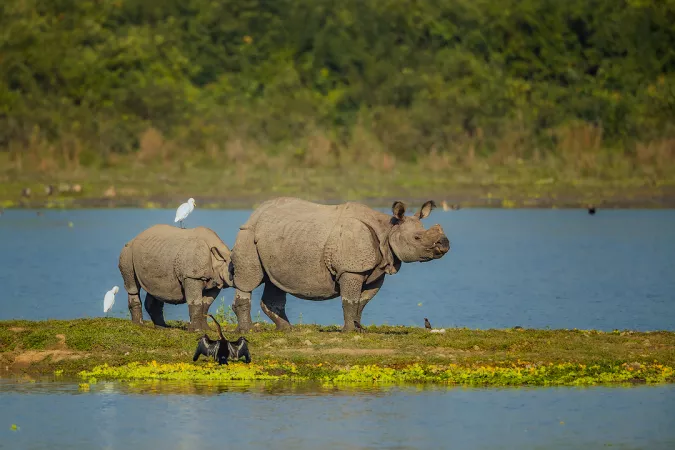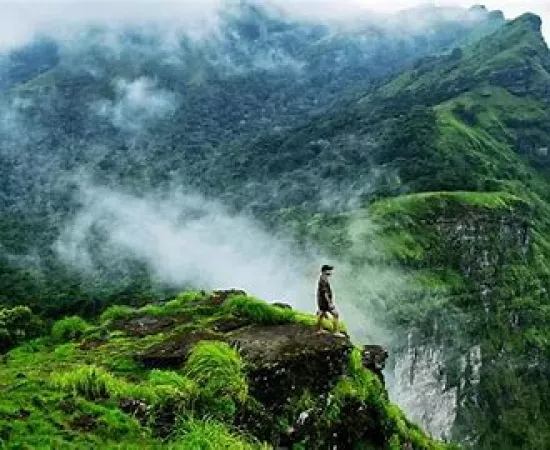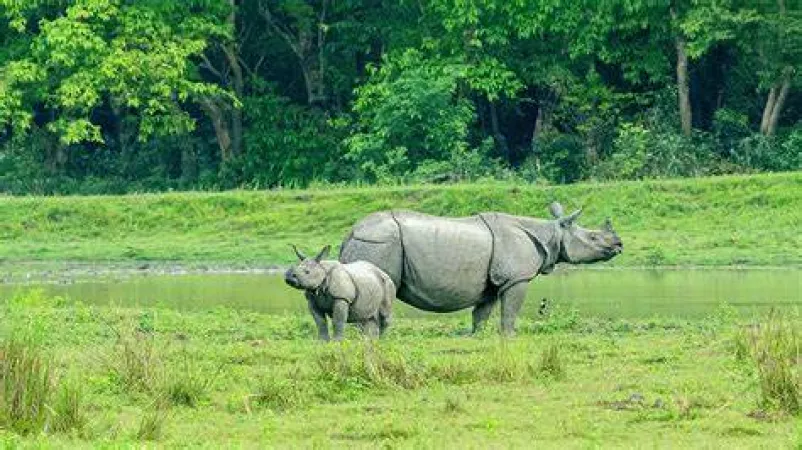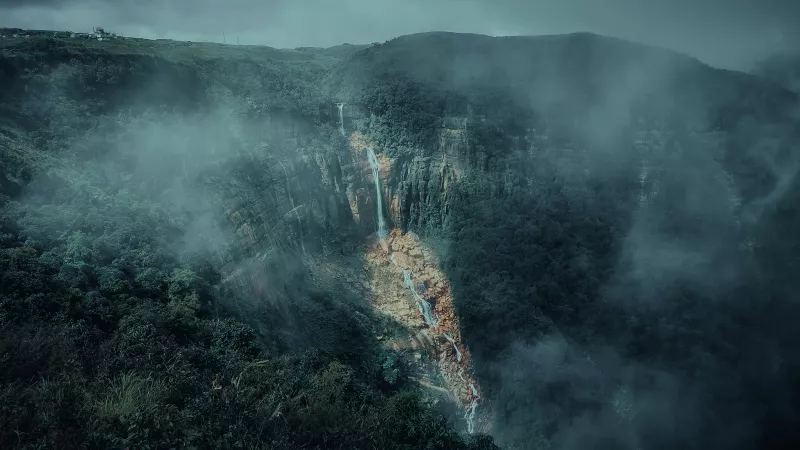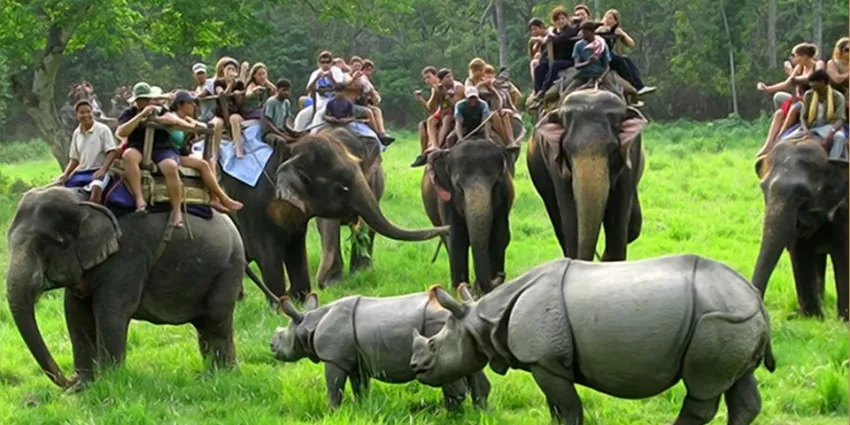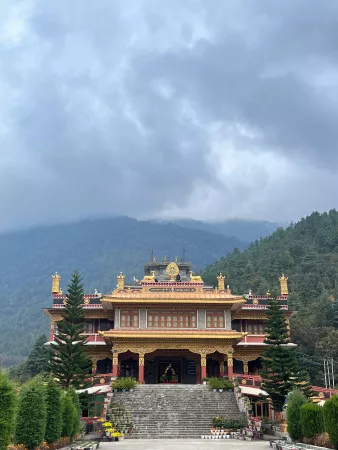6 Top Kaziranga national park Tour Packages
About Kaziranga national park
Kaziranga National Park Travel Guide
Kaziranga National Park, located in the state of Assam, India, is a UNESCO World Heritage Site known for its significant population of the Great Indian One-Horned Rhinoceros. The park is spread over 430 square kilometers and is home to a variety of wildlife, including tigers, elephants, and water buffaloes. The park's diverse ecosystem of grasslands, wetlands, and forests make it a unique destination for nature lovers and wildlife enthusiasts alike.Top Attractions in Kaziranga National Park
- Embark on an exhilarating elephant safari to spot the iconic one-horned rhinoceros up close.
- Take a jeep safari through the park to explore its rich biodiversity and encounter various wildlife species.
- Visit the Panbari Reserve Forest to witness a plethora of bird species, making it a paradise for birdwatchers.
- Experience the vibrant culture of the local tribes by interacting with the indigenous communities in the surrounding areas.
Kaziranga National Park is Famous for
Known for its remarkable population of the Great Indian One-Horned Rhinoceros.Top Attractions in Kaziranga National Park
- Embark on an exhilarating elephant safari to spot the iconic one-horned rhinoceros up close.
- Take a jeep safari through the park to explore its rich biodiversity and encounter various wildlife species.
- Visit the Panbari Reserve Forest to witness a plethora of bird species, making it a paradise for birdwatchers.
- Experience the vibrant culture of the local tribes by interacting with the indigenous communities in the surrounding areas.
What's Great about Travelling to Kaziranga National Park?
- Perfect destination for nature enthusiasts and wildlife lovers.
- Opportunity to witness the majestic one-horned rhinoceros in their natural habitat.
- Rich cultural experiences with interactions with local tribes.
What's Not So Great about Travelling to Kaziranga National Park?
- Limited accommodation options within the park.
- Monsoon season can make wildlife spotting challenging due to heavy rainfall.
- Some areas of the park may be inaccessible during certain times of the year.
Travel Tips for Kaziranga National Park
- Obtain necessary permits and follow park rules for a safe and enjoyable experience.
- Book safaris in advance to secure your spot, especially during peak tourist seasons.
- Wear comfortable clothing and suitable footwear for jungle excursions.
Important Kaziranga National Park trip information
- Ideal Duration: 2-3 days to explore the park thoroughly.
- Best Time to Visit: November to April for the best wildlife sightings.
- Nearby Airports and Railway Stations: The nearest airport is in Guwahati, approximately 200 km away, and the closest railway station is in Furkating, around 75 km from the park.
ReadMore
| Packages | Price | Duration | Destinations | Quotes |
|---|---|---|---|---|
| Magical Shillong & Kaziranga 5N6D | ₹ (INR) 24400 | 5 Nights / 6 Days | Kaziranga National Park | Get Quotes > |
| Enchanting North East: 7 Nights/8 Days Tour Package | ₹ (INR) 34990 | 7 Nights / 8 Days | Dawki, Guwahati, Kaziranga National Park, Shillong | Get Quotes > |
| Exotic North East- 11 Days 10 Nights | ₹ (INR) 40000 | 10 Nights / 11 Days | Dawki, Dirang, Kaziranga National Park, Shillong, Tawang | Get Quotes > |
| Discover 5 Nights & 6 Days Meghalaya Tour – Where the Clouds Kiss the Earth | ₹ (INR) 16500 | 5 Nights / 6 Days | Cherrapunji, Guwahati, Kaziranga National Park, Shillong | Get Quotes > |
| Meghalaya Tour Package For Four Person | ₹ (INR) 19000 | 5 Nights / 6 Days | Cherrapunji, Guwahati, Kaziranga National Park, Shillong | Get Quotes > |
Tripclap connects you with top travel agents
Compare Custom Quotes and get the best package deal
- Trusted Network Of 8000+ Agents.
- Book everything together, including stay & transport.
- Compare agent profiles & verified reviews
How It Works?
Compare Custom Quotes from Top Travel Agents.
- Tell us about your trip.
- Get Custom quotes from top agents.
- Choose the package you like
Price Per Person ₹ (INR) 24,400
Price Per Person ₹ (INR) 40,000
Meghalaya Tour Package For Four Person
5 Nights / 6 Days
Destinations : Cherrapunji, Guwahati, Kaziranga National Park, Shillong
Kaziranga national park Tour Package by
Raagi tour and travels
5.0 Ratings ( 8 reviews ) ![Verified]() Verified
Verified ![premium]() Premium
Premium
Price Per Person ₹ (INR) 19,000
FAQ's on Kaziranga national park
1. Q1: What is the best time to visit Kaziranga National Park?
The best time to visit Kaziranga National Park is from November to April when the weather is pleasant, and the park is open for visitors. This period offers a higher chance of spotting wildlife, especially the famous one-horned rhinoceros, as the grass is shorter, and animals gather around water sources. It's advisable to avoid the monsoon season (May to October) due to heavy rainfall, which can lead to park closures and limited wildlife sightings.
2. Q2: Do I need a visa to travel to Kaziranga National Park?
Foreign tourists visiting Kaziranga National Park will need a valid Indian visa. The e-Visa facility is available for travelers from eligible countries, allowing for easier online visa applications. It's essential to check the specific visa requirements based on your nationality and travel plans. Some nationalities may be eligible for visa exemptions or visa-on-arrival facilities, but it's recommended to confirm this information before planning your trip.
3. Q3: What are the must-visit attractions in Kaziranga National Park?
Kaziranga National Park is renowned for its diverse wildlife and stunning landscapes. The top attractions include Jeep safaris to spot rhinoceros, tigers, elephants, and more in their natural habitat. Elephant safaris offer a unique and up-close wildlife viewing experience. Kaziranga also boasts picturesque tea gardens, the scenic Brahmaputra River, and the vibrant local villages where visitors can immerse themselves in Assamese culture and traditions.
4. Q4: Is Kaziranga National Park a safe place to travel?
Kaziranga National Park is generally a safe destination for travelers. However, it's essential to follow safety guidelines provided by park authorities, especially during wildlife safaris. Avoid straying off designated paths and maintain a safe distance from animals. It's advisable to be cautious of wildlife encounters, particularly while exploring the park on foot. Additionally, staying updated on weather conditions and park regulations can contribute to a safe and enjoyable visit.
5. Q5: What is the local currency in Kaziranga National Park and can I use credit cards?
The local currency in Kaziranga National Park is the Indian Rupee (INR). While credit cards are accepted at some hotels, restaurants, and larger establishments, it's recommended to carry cash for smaller purchases and transactions. ATMs are available in nearby towns like Kohora and Bokakhat, where visitors can withdraw cash. Inform your bank about your travel plans to ensure smooth card transactions and check for any foreign transaction fees that may apply.
6. Q6: What is the local cuisine like in Kaziranga National Park?
The local cuisine in Kaziranga National Park offers a delightful culinary experience for visitors. Assamese cuisine is characterized by its use of fresh ingredients, rice, fish, and flavorful spices. Must-try dishes include traditional Assamese thalis, fish curries, bamboo shoot delicacies, and pithas (rice cakes). Vegetarian and non-vegetarian options are available, catering to various dietary preferences. Visitors can savor authentic Assamese flavors at local eateries, roadside stalls, and resorts within and around the park.
7. Q7: What transportation options are available in Kaziranga National Park?
Transportation options in Kaziranga National Park include private vehicles, taxis, and guided tours. Visitors can hire jeeps for wildlife safaris within the park, offering an exciting way to explore the vast wilderness and spot diverse wildlife. Additionally, elephant safaris provide a unique and eco-friendly mode of transportation for wildlife enthusiasts. Public buses and shared taxis are available for travel to and from Kaziranga, connecting it to nearby towns and cities. It's advisable to book transportation services in advance, especially during peak tourist seasons.
8. Q8: Are there any cultural norms or etiquette I should be aware of when visiting Kaziranga National Park?
When visiting Kaziranga National Park, it's important to respect local customs and cultural norms. Dress modestly, especially when visiting religious sites or interacting with local communities. Seek permission before photographing individuals and avoid disrupting wildlife or natural habitats. Greeting people with a "Namaskar" (hello) is a common practice in Assam, showcasing politeness and respect. Participating in local festivals and cultural events can offer insights into Assamese traditions and way of life. Remember to remove shoes before entering homes or religious places and be mindful of waste disposal to help preserve the park's natural beauty for future generations.
